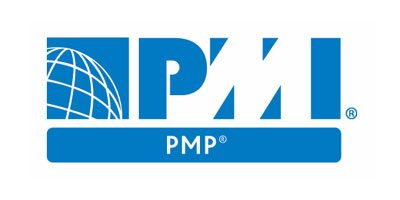[wpseo_breadcrumb]

PMP - Project Management Professional
PMP – Project Management Professional course can be done for any person having 4500 hrs and 36 months of unique non-overlapping project management experience leading and directing project tasks and holding a baccalaureate or global equivalent university degree, or he/she should have 7500 hrs and 60 months of experience if he/she does not hold a baccalaureate or global equivalent university degree.
Duration: 35 Contact Hours (4 Days)
Course Content
Objectives
- Understand Processes and Knowledge Areas explained in PMBOK® Guide
- Understand Common Project Management terminology as described by Project Management Institute (PMI,USA)
- Understand Management concepts/ framework as per PMBOK® guide
- Receive 35 contact Hours of formal Project Management Training Certificate as part of PMP® certification requirements
- Major step for getting prepared for the PMP® certification examination
Features
- Establish a common vocabulary and understanding of basic Project Management terms and concepts as in PMBOK® Guide – viz. project, project management, stakeholders, earned value, scheduling techniques, and Project Managers’ responsibilities and competencies.
- Describe the purpose, inputs, and outputs of the processes in each of the five Process Groups: Initiating, Planning, Executing, Monitoring and Controlling, Closing.
- Define the 9 Project Management Knowledge areas & explain the relationship of Process groups, knowledge areas, project phases, project & product Life Cycle.
- Understand the importance of Project Charter, Scope Statement, Work Breakdown Structure (WBS), Responsibility Matrix, Network Building, and CPM.
- Demonstrate a clear understanding of what activities, tools, & techniques, are necessary in each phase of a project & understand the PMP® examination nuances.
- Understand, acknowledge & appreciate importance of Risk management, Procurement Management, Human Resource Management.
Who should attend
Any person having 4500 hrs and 36 months of unique non-overlapping project management experience leading and directing project tasks and holding a baccalaureate or global equivalent university degree, or he/she should have 7500 hrs and 60 months of experience if he/she does not hold a baccalaureate or global equivalent university degree.
Participant’s kit
- A reference to contents of the Project Management Body of Knowledge (PMBOK® Guide) by Project Management Institute, U.S.A.
- Course material, which includes presentations and comprehensive test on each knowledge area & process groups and a training follow up comprehensive test (Assess yourself!!) on the lines of PMP® examination.
- Certificate of Participation for 35 Contact hours of training by Vinsys IT Consultancy, PMI R.E.P. Global (formerly System Consultants). Candidates applying for PMP® certification examination, have to submit a minimum of 35 contact hours and Certificate of Formal Project Management education preferably through PMI R.E.P.
Course Outline
- Overview of Project Management
- Introduction and Key Concepts in Project Management
- Reasons why Project Management is required
- Differences between Projects & Operations
- Overview of PMBOK® Guide
- Project and Product Life Cycles
- Organizational Impact
- Approaches in Organizational structure and its impact
- Functional vs. Project based & Matrix Structure
- Understanding process in each knowledge area
- Project Integration Management
- Project Scope Management
- Project Time Management
- Project Cost Management
- Project Quality Management
- Project HR Management
- Project Communication Management
- Project Risk Management
- Project Procurement Management
- Understanding the importance and utilization of Scope statement
- WBS
- scheduling techniques
- Cost baseline
- Quality Assurance
- Communications Plan
- Managing Human Resources
- Contract Administration and Risk Response Plan
- Revision of PMBOK® Guide- through knowledge areas and process groups.
- Discussions on tips & tricks,
- Preparation for PMP® examination.
- Assignments, homework and plan for post course studies.
Course Contents
Day 1
- Introduction: Participants & Faculty
- Objectives of the Training program
- Brief information about PMI procedures & PMP exam
- Understanding Professional responsibility part of PMI certification
- What is Project? What is Project Management?
- Why Project? Project Management Context
- Influencing factors: Project success & Failure
- Projects & Operations
- PMBOK® Guide Knowledge Areas and Process Groups
- PMBOK® triple constraints & expanded constraints
- Project Phases, Project Life cycle, Product Life Cycle
- Types of organizations& its Impact on Project Management
- Assessment/Pre-assessment “Let’s get into it!”
- Develop Project Charter Process
- Project Selection Methods: Understanding of “NPV, ROI, IRR” terminology
- Identify Stakeholders Process
Day 3
- Revision of Day-2
- Estimate Costs Process
- Determine Budget Process
- Control Costs Process
- Earned Value Management (EVM) & Exercise on EVM (Performance Analysis and Forecasting)
- Assessment Test: Project Cost Management
- Plan Quality Process
- Perform Quality Assurance Process
- Perform Quality Control Process
- Assessment Test: Project Quality Management
- Plan Communications Process
- Distribute Information Process
- Manage Stakeholder expectations Process
- Report Performance Process
- Assessment Test: Project Communications Management
Day 2
- Revision of Day-1
- Develop project management Plan Process
- Collect requirements Process
- Define Scope Process
- Create WBS Process
- Verify Scope Process
- Perform Integrated Change Control Process (PICC)
- Direct & Manage project execution Process
- Monitor & Control project work Process
- Control Scope Process
- Assessment Test: Project Scope Management
- Define Activities Process
- Sequence Activities Process & Exercise Precedence diagramming method
- Estimate activity resources Process
- Estimate activity durations Process
- Develop Schedule Process
- Control Schedule Process
- Assessment Test: Project Time Management
Day 4
- Develop Human Resource Plan Process
- Acquire Project Team Process
- Develop Project Team Process
- Manage Project Team Process
- Assessment Test: Project Human Resource Management
- Assessment=II Progress review
- Plan Risk Management Process
- Identify Risks Process
- Perform Qualitative Risk Analysis Process
- Perform Quantitative Risk Analysis Process
- Plan Risk response Process
- Monitor & Control Risks Process
- Assessment Test: Project Risk Management
- Plan Procurements Process
- Conduct Procurements Process
- Administer procurements Process
- Close Procurements Process
- Assessment Test: Project Procurement Management
- Close Project or Phase Process
- Assessment Test: Project Integration Management
- Post Training follow up assignment-“Assess Yourself”
